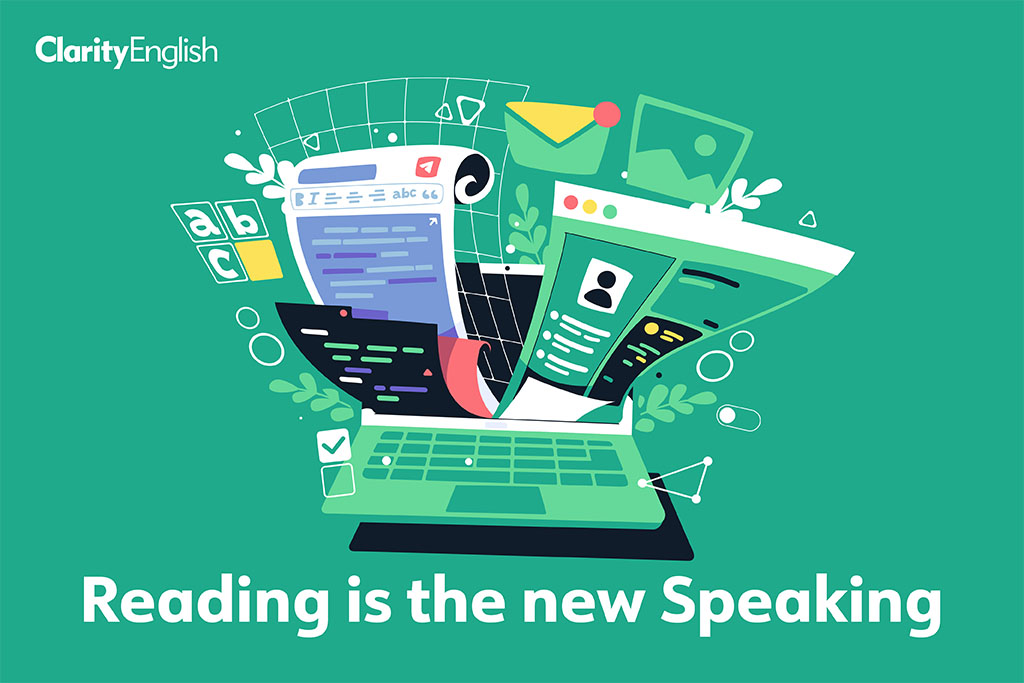Surprisingly little has been written about the shift from speaking to reading as the dominant language skill for most social interactions. Not that long ago we’d visit a travel agent to discuss an overseas trip, and a real estate agent to rent a flat; these days, we click into a website. A few short years ago, a parent would phone round to organise a child’s birthday party; now it’s all done on Whatsapp.
We speak a lot less than we used to, and read a lot more. So it was interesting, last month, to take part in a library webinar focusing on how best to equip migrants with the language skills they need to integrate effectively into their communities, and to build their confidence in doing so. It was no surprise that the primary focus of the session was helping learners develop their reading skills.
As a measure of how central to our lives reading has become, consider the activities that, for many people, take place before they’ve even had breakfast:
- Checking messages
- Checking the news
- Checking social media
- Checking your calendar to see what you’re going to be doing today
- Checking emails, which may include personal emails and a quick trawl through work emails
- Checking an app, which could be fitness / diet / music / podcast, according to taste
You’ll notice two things: firstly, that all of these reading activities are digital; and secondly, that they involve different reading skills. For example, when you check your music app you’re scanning for the name of the song you want to listen to. You recognise it as a single unit of meaning, tap on it, and that’s job done. It is fairly straightforward for a migrant to transfer this skill from their L1 to English, even if they are operating in a different alphabet or writing system.
But when you are reading a news story you are engaging with the text in a much more cognitive way, looking at signpost words and tenses, maybe guessing the meaning of a word you don’t know. And you are also bringing your own meaning to the text: if I’m reading a news story about Ukraine I’m having a very different experience from someone who has a family connection to the conflict. This range of skills (and knowledge) makes this task much more challenging for migrants and other learners of English than interacting with a music app.
With this in mind, it was useful to look at a few other reading activities that migrants need to master, and to identify the reading skills associated with them. Here are five:
- Searching for a house to rent on a website. The primary skills are to be able to navigate the website and read for information. It’s easy to predict what you will see both as you go through the search and in the output.
- Participating in group chats, perhaps to organise a birthday party. Let’s consider a mother or father building the confidence to do this within a school friendship group. The reading skill is to be able to operate in TextSpeak: to understand the very different grammar and vocab that is used on Whatsapp.
- Reading a food label. Perhaps there is a child visiting the house who is allergic to soy. The carer needs to be able to scan the food label looking for the single word ‘soy’ and ignoring everything else.
- Reading critically. With online purchasing, it’s easy to be taken advantage of financially if you don’t understand each part of the ordering process. This is particularly true of newcomers to a country who additionally have to navigate the wider social context of the website. They need to be able to bring their critical faculties to bear on what they are reading.
- Finally, navigating Covid regulations, for example when entering the country. Although this is website-based, it is quite different from searching online for a house to rent. Having been through this myself, I can testify that you don’t know what to expect, it’s very high stakes and stressful, and every detail counts. (I’d hate to do it in another language.)
It’s useful to be able to list the discrete reading skills that migrants need to master to complete these tasks effectively. It means we can build awareness among these learners of how they can focus on the practical outcomes of their studies. All that’s required is motivation, and to have access to the right reading program from the public library website. I recommend Clarity’s own Active Reading, the lower levels of which were written specifically to help the migrant community.

